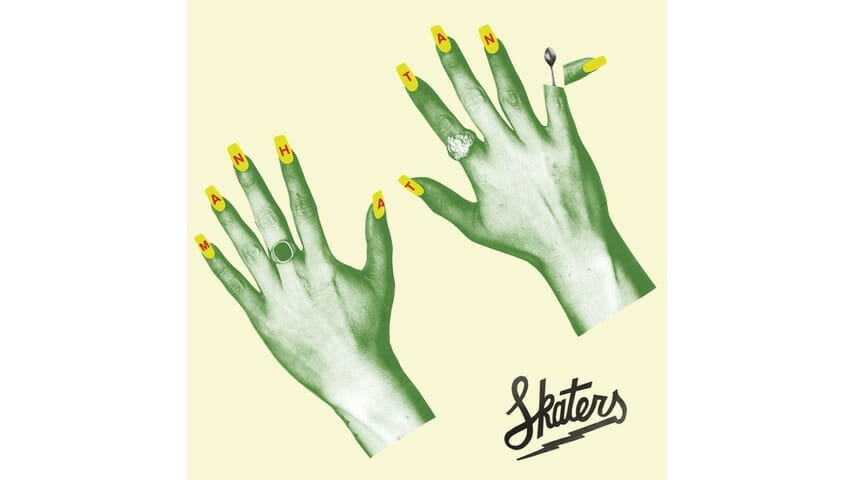
In the 37 years since the Ramones immortalized Rockaway Beach, it only makes sense that romantic images of 1970s New York have continued to percolate in the collective imagination. Of course, the charm wears off a bit every time a New York-based musician or filmmaker can’t resist another opportunity to remind us where they’re from. By naming its debut album Manhattan—which begins overtly enough with the sound of a PA announcement on a Manhattan-bound subway train—the nouveau-punk outfit SKATERS tattoos its fascination with the Big Apple onto its music, and thus onto the audience’s experience of it as well. Not only is the band enthralled by the Bowery of popular lore, it also clearly seeks to insinuate itself into the pantheon of storied acts to have emerged from there.
To be fair, SKATERS draw their energy and drive from their adoptive hometown. Hailing from the suburbs of Boston, frontman/principal songwriter Michael Ian Cummings and drummer Noah Rubin initially attempted to launch their music careers out of Portland, Ore. (and then later in southern California) in the folk-rock group the Dead Trees. Last summer, Cummings and Rubin told Paste that, just as they were forming the seeds of what would become SKATERS, they moved to New York to put themselves in a faster-paced, more challenging environment. In so many ways, Manhattan, with its combination of racecar riffs and downtempo reggae, proves that they have risen to the challenge.
Like the borough from which it takes its name, Manhattan makes impressive, attention-grabbing noise in a state of paradox where fashion-consciousness meets no-bullshit attitude, where brash meets approachable, where flamboyant expressiveness meets the constant rush of being on the go, and where having boundless access to culture is only as good as the tiny sliver you can afford after you pay the rent. Cummings populates his songs with decadent wastrels adrift in the privileged malaise of an endless party. On the anthemic “To Be Young in NYC,” for example, he sings about a “generation of jerks” (the original album title) that finds itself “directionless on our feet.” But Cummings chooses his words cleverly enough so that the listener can’t tell whether he’s observing these people from a cautious distance or celebrating their antics. Judging from the equal measures of jubilance and grit in the music, he’s probably doing both. (Oh, and is that supposed to be a coke spoon on the album cover?)
If SKATERS are courting the myth of New York, they also have the temerity to take the piss out of the place at the same time. Most importantly, though, they cram Manhattan with enough purely musical substance to hook listeners who wouldn’t otherwise fall for more of that city-that-never-sleeps/center-of-the-universe schtick. Ironically, while band and label have been keen to point to downtown icons like The Ramones, Talking Heads, Yeah Yeah Yeahs and The Strokes, Manhattan lands SKATERS closer to another prestigious lineage: not since The Clash, The Police and Bad Brains has a group walked the line between punk and reggae with such inventive flair.
With the help of producer John Hill (Phantogram, M.I.A., Wavves, Shakira) Cummings and guitarist/co-founder Joshua Hubbard (The Paddingtons, Dirty Pretty Things) weave guitar lines together into a glassy meshwork that sparkles with clarity while retaining the grit and jangle the lyrics call for. Rubin, who laid down a kind of languid shuffle in the Dead Trees, sounds like a completely different drummer here as he alternates between pistonlike precision and slinky grooves fitting of an intoxicated, pre-dawn stroll home from an after-hours soirée. Cummings, meanwhile, makes anthems out of verses and pre-choruses before we even get to choruses that positively soar with melodic release.
Just before Manhattan’s final song gets underway, an interlude captures Rubin in an exchange with a jolly, heavily accented NYC cabdriver. The cabbie tells Rubin that he’ll pray for him before bursting into song, and both men laugh heartily. As Rubin reaches his destination, the last thing we hear before the music kicks in is the sound of the car door slamming shut. It’s precisely the type of random encounter that makes life in migrant cities like New York so vibrant. In some ways, SKATERS might as well be as fresh off the boat, so to speak, as this cabdriver, whose voice—most likely unbeknownst to him—now goes down as a cameo in the annals of rock and roll. Where “Rockaway Beach” pines for the faded dream of more innocent times, Manhattan revels in today’s New York—good, bad and ugly. To their credit, as outsiders looking in, SKATERS make themselves at home with a flair that borders on audacity. With this album, they’re likely to do the same with pop music as a whole, which could use this type of roughing-up anyway. Let’s just hope these guys are astute enough to survive their own party—and their own hype.